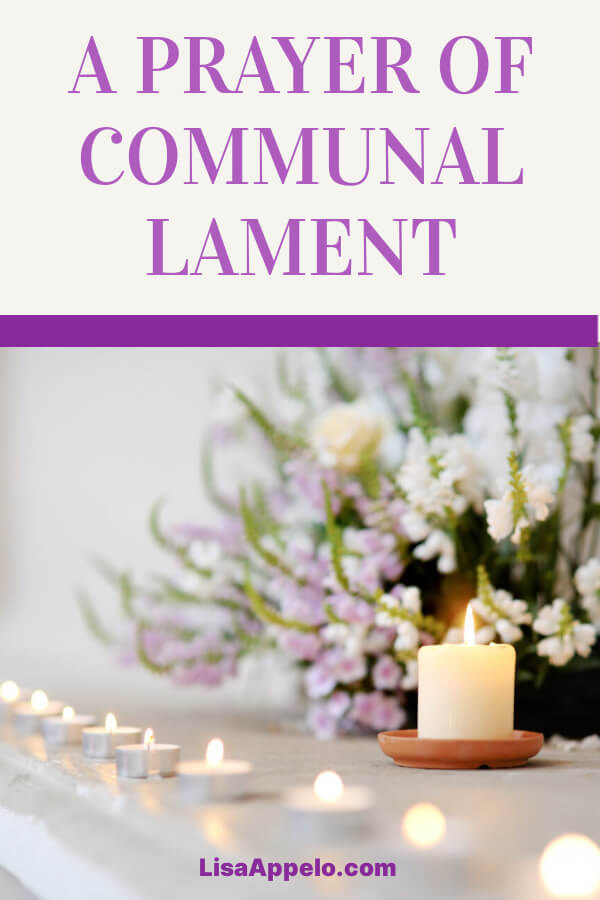
When a community or nation experiences shared grief from a tragedy, disaster or injustice, communal lament offers a way to process that grief.
When shock and horror rise to the top, when our insides churn with nausea at evil, when words are wholly inadequate, lament gives us a language to express sorrow and ask God to help and heal.
I first learned to lament when my life shattered in loss after the sudden death of my husband. I didn’t even realize at the time that my deep gutteral cries, my questions and my desperate prayers to God to help me find a way through grief were expressions of lament.
Lament is God’s invitation to come to Him with grief too heavy to carry. Because we were not made for death or devastation or trauma. And yet it’s all around us.
Sometimes communal grief comes when the pain of one reverberates through the whole congregation. I saw this as a young mom, when a couple in our young marrieds class suffered not one but two back-to-back stillbirths. On a drizzling weekday morning, we gathered around a tiny white casket sitting next to a freshly dug grave to grieve the unthinkable.
I carried my friends’ pain through my days even as I tickled my own littles and signed up to bring them dinner. Knowing our shared grief, our pastor shepherded all of us that Sunday as he set aside his planned sermon to teach us why believers endure such suffering.
Communal grief also comes when a nation grieves the unthinkable. The loss reverberates across screens and images into our homes and offices and conversations. We carry the pain of devastated families and reeling communities as we fold clothes and sit in carline miles away.
“A healthy body is not one that feels no pain. A healthy body is one that attends to the pain of its weakest part,” says Phillip Yancey.
God created us in community and for community. So how do we attend the pain of those hurting in the body? The pain of injustice and tragedy and outright evil in communities, states or countries away? God has given us the language of communal lament.
Communal lament is the Biblical response to processing our shared grief.
Communal Lament in the Bible
The entire book of Lamentations (which stems from the Latin word meaning weeping or wailing from deep grief) is one long national lament over the destruction of Jerusalem and God’s judgment against Judah. A prayer of communal lament is found in 2 Chronicles 20:5-12 when the Moabites and Ammonites united against Israel.
More than one-third of the Psalms are lament and many of those are communal. My daily reading happened to be Psalm 44 as news reports and videos revealing the horrors of Hamas’ attack on Israeli civilians was coming out. The psalm was a solid reminder of God’s established purpose for Israel. I didn’t just read the psalm; I prayed it. Praying scripture helps us pray God’s word back to him. You can find prayers of communal lament in Psalms 44, 60, 74, 79, 80, 83, 85, 90, 94, 123, 126 and 137.
Communal lament shows up in different ways.
Sometimes we can’t even put words to our sorrow. The grief is too fresh grief or too raw or too disorienting. Yet God has gone before us, knowing we’d deal with circumstances where we couldn’t muster up words enough to express our grief.
Romans 8:26 assures us that lament without words reaches God’s ear. “Likewise, the Spirit helps us in our weakness. For we do not know what to pray for as we ought, but the Spirit himself intercedes for us with groanings too deep for words.” (ESV)
Your inexpressible grief that comes as groans or sighs, the tightening in your chest and the pit in your gut, the wordless exasperations or outrage — they are known and heard, laid on the very throne of God on your behalf.
Other times, lament comes as hard questions, strident anger over injustice, or audible cries and these too God welcomes. We see this in Habakkuk, where the prophet lamented over the injustice around him and went to God with his questions.
“O LORD, how long shall I cry for help, and you will not hear?
Or cry to you “Violence!” an you will not save?
Why do you make me see iniquity, and why do you idly look at wrong?
Destruction and violence are before me; strife and contention arise.
So the law is paralyzed, and justice never goes forth.
For the wicked surround the righteous; so justice goes forth perverted.” (Hab 1:1-4, ESV)
God never rebuked Habakkuk for this lament but actually answered his questions. We too are safe to go to God with our hard questions in grief when we have a right heart.
Communal lament looks to God for help.
Lament isn’t a place to dump accusations and bitterness on God. It’s a place to express our sorrow, our questions and even despair and then ask for God’s help.
In the wake of tragedy and injustice, how will we respond? We need God’s wisdom as much as we need His comfort in tragedy. The good news is that God delights in helping us in our troubles.
Part of communal lament is our prayer asking God to help those hurting and to guide leaders, and churches and communities to respond well. We can ask God to humble us, turn our hearts and nation to Him, restore us, provide resources and let His righteous ways prevail.
Communal lament encompasses more than emotion.
Communal lament is always more than airing our grievances and emotions. God doesn’t call us to simply vent our emotions. He calls us to trust Him with the circumstance.
Lament allows us to unburden our heart from emotions and questions too heavy for us while accepting we live in a fallen world and don’t get a pass from suffering. This world is not our home and until we get to heaven or Christ returns, this world will be marred by sin and its consequences – tragedy, evil and natural disasters.
While our hearts may be broken over the suffering, ultimately we trust that God is sovereign and is working His good in ways we can’t see or understand.
Lament never accuses God of evil or that He is against us but trusts that God is good and is for us. Communal lament may start with our grief, despair and questions but it always ends with trusting the character of God.
In the coming weeks, I’ll be adding a few prayers of communal lament for different circumstances to this post, but today especially, I wanted to offer this prayer of communal lament over violence.
A Prayer of Communal Lament
Oh God, our hearts are broken over this tragedy and this evil act against our most vulnerable and innocent. We look to You to be near to the brokenhearted to save those crushed in spirit. Break our hearts for what breaks Yours and give us deep compassion not just in words but in our actions.
We need Your wisdom as much as we need Your comfort. We want to be a people who reflect You in all things. We long for Your righteous ways to prevail. Help our leaders and churches and communities respond to the crisis in our land. Turn our hearts to You and align our minds and hearts to Yours.
We come to You humbly and repentant over the sin in our land and the sin in my own life. Forgive us Lord. Heal us Lord. Comfort us and draw us to You. You are our hope. In Jesus’ name, Amen.




Amen. You said it. Thank you for your words. Your words were moving and touching. These times are hard for those families, but God has his arms wrapped around them comforting them. They may not know it but he does have his arms around them. He has his arms around you also. He loves us all. Have a blessed night.
Thank you so much for sharing your story and the relevant scriptures that helped with your deep and traumatic loss. I have a new understanding of lament and the comfort it offers to life shattering tragedies that are hard to understand and society shuns.